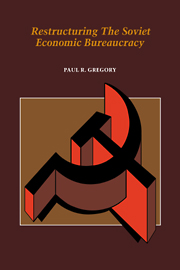Appendix: interviewing former Soviet economic bureaucrats
Published online by Cambridge University Press: 24 March 2010
Summary
Former Soviet bureaucrats as a source of information
This study uses in-depth interviews with former members of the Soviet economic bureaucracy as an important source of information. Interview information must be treated differently than quantitative statistical data for reasons that will be discussed here. This appendix describes the collection, use, and interpretation of interview data.
Emigrants as expert informants
Studies of Soviet life based on the experiences of former Soviet citizens are of two types. The first involve interviewing a large number of former Soviet citizens on general issues of life in the Soviet Union (such as earnings, employment, political activities, and perceptions of quality of life) in order to gain insights into the characteristics of a referent Soviet population. In this type of large-scale survey research, respondents are selected on the basis of sampling criteria (such as age or educational background) that make the emigrant sample as similar as possible to the referent population. Western scholars have studied Soviet emigrants to acquire valuable information on work, politics, and daily life in the Soviet Union.
The second type of research involves the selection of a relatively limited number of respondents who had special backgrounds and experiences in the Soviet Union. For example, respondents who worked as factory managers, statisticians, or lawyers in the Soviet Union have been studied to shed light on selected Soviet professions or institutions.
The present study falls under the second category of research.
- Type
- Chapter
- Information
- Restructuring the Soviet Economic Bureaucracy , pp. 168 - 176Publisher: Cambridge University PressPrint publication year: 1990

